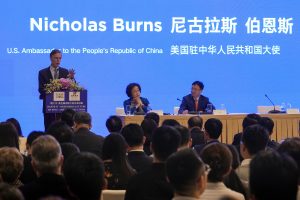China’s support for Russia’s full-scale invasion of Ukraine through the provision of technology for missiles and other weaponry is a “major mistake,” U.S. Ambassador to Beijing Nicholas Burns said Wednesday.
In a speech in the Chinese financial hub of Shanghai, Burns also said Russia’s invasion, now in its third year, had become an “existential crisis” in Europe.
“We think it’s a major mistake to allow Chinese companies, by the thousands, to be sending so many components, technology components, microprocessors (and) nitrocellulose to Russia to reinforce and strengthen the defense industrial base of the Russian Federation for this brutal war,” Burns said.
China “is not neutral, but has effectively sided with Russia in this war,” the ambassador said, adding that the decision directly contradicted China’s longstanding insistence on “sovereignty and territorial integrity.”
China insists it does not provide direct military aid to Russia but has maintained strong trade ties throughout the conflict, along with visits between Russian President Vladimir Putin and Chinese leader Xi Jinping.
China is also a major purchaser of Russian oil and gas, providing a lifeline for Moscow’s war economy that is under international sanctions. Prior to Russia’s February 2022 invasion of Ukraine, China and Russia signed an agreement vowing a limitless friendship. China has refused to refer to the invasion as such and has blamed NATO for provoking Putin.
There was no immediate Chinese reaction to Burns’ remarks, which came during a seminar on China-U.S. relations centered on the life of Henry Kissinger, a career diplomat who died last year.
In a recent interview with The Wall Street Journal, Burns also criticized Beijing for undermining people-to-people cultural and educational exchanges by interrogating and intimidating citizens who attend U.S.-organized events in China, ramping up restrictions on the embassy’s social media posts and whipping up anti-American sentiment.
His comments drew a rebuke from the Chinese foreign ministry.
“It is the U.S., not China, that has disrupted and prevented cultural and people-to-people exchanges between the two countries,” Chinese foreign ministry spokeswoman Mao Ning said Wednesday. “The U.S. has used national security as a false pretext to harass, interrogate and deport Chinese students arriving in the U.S. Such moves inflicted enormous damage on the persons concerned. They’ve created a chilling effect.”
In Washington, the State Department “absolutely” agreed with “everything the ambassador said” in the interview, spokesman Matthew Miller said.
“It’s very hard” to improve people-to-people relations “when the Chinese government harasses either American citizens who are in China or harasses Chinese citizens who participate in … or attempt to participate in American programs,” Miller said.
In the past, the State Department has said it welcomed Chinese students, and that said fewer than “one tenth of 1%” of them have been detained or denied admission.
Relations between Washington and Beijing also remain fraught over trade, territorial disputes and the self-governing island democracy of Taiwan. The U.S. maintains close political and military relations with Taiwan despite their lack of formal diplomatic ties in deference to Beijing.
China claims the island as its own territory to be annexed by force if necessary. It has threatened in recent days to hunt down “hardcore” supporters of the island’s continued independence and sentence them to death. There was no indication how it intended to act on the threat.

































